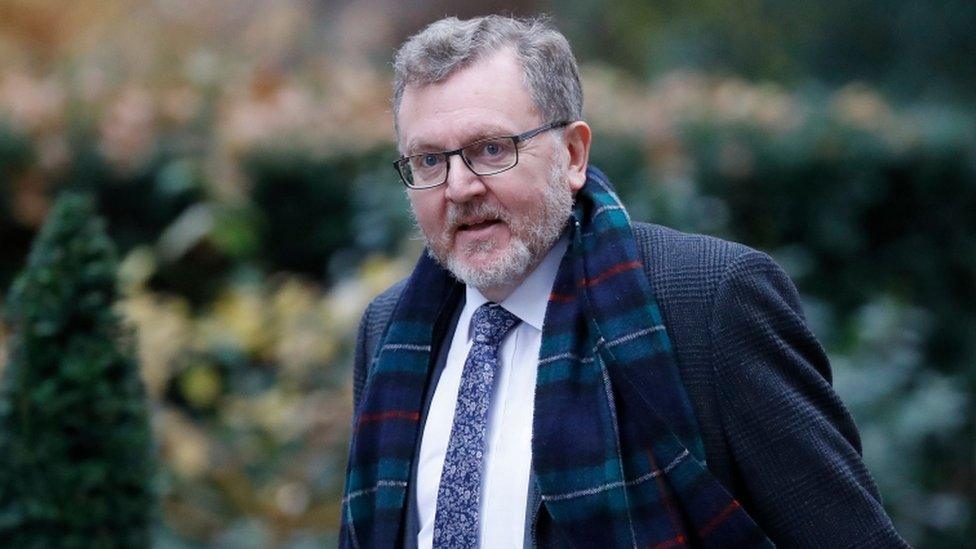Delay to Brexit bill amendments confirmed
- Published
- comments
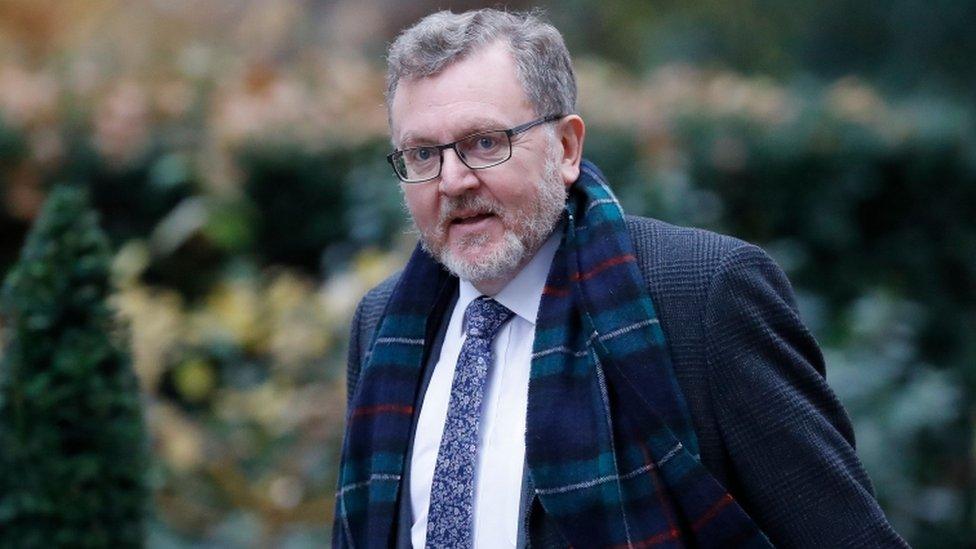
Mr Mundell had previously told MSPs the amendments would be introduced in the Commons
Promised changes to the UK government's EU Withdrawal Bill that would reflect concerns over its impact on devolution will be delayed, it has been confirmed.
Scottish Secretary David Mundell told MPs last month, external that the amendments would happen during next week's report stage in the House of Commons.
However, he has now said the changes will not happen until the bill reaches the House of Lords.
He also said the government remained committed to improving the bill.
Government sources said that the resignation of Damian Green - who had been leading talks with the devolved administrations - from his Cabinet Office post, coupled with the festive break, had caused the timetable to slip.
The Scottish government has previously said it would not put the legislation to a consent vote in the Scottish Parliament unless changes are made.
Mr Mundell said: "I can confirm today that amendments to clause 11 of the bill will be brought forward in the House of Lords, allowing for further discussions to take place between the UK government and Scottish government.
"A substantial number of powers will transfer direct to the Scottish Parliament. The two governments agree that in some areas common frameworks will be required.
"I regret that it has not been possible to bring forward amendments at the report stage but our commitment to improve the bill remains absolute. The most important thing is that the changes we bring forward command support on all sides, and talks between Scotland's two governments will continue."
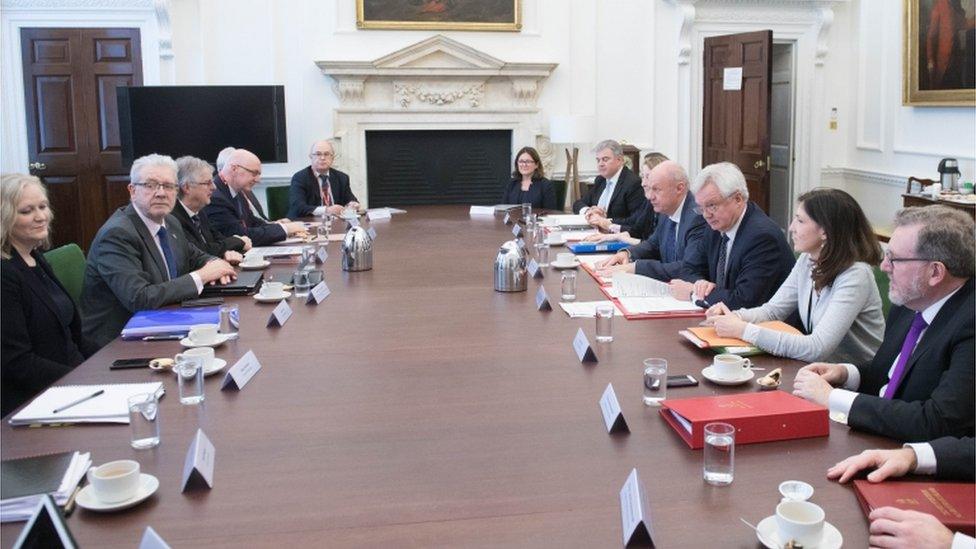
A series of summits between ministers from around the UK have failed to resolve the impasse over post-Brexit powers
He added: "I remain confident we can reach a place where the Scottish Parliament will give legislative consent to this vitally important piece of legislation.
"The two governments have made good progress on how powers should be brought back from Brussels, including through the JMC(EN) meetings, and expect to make further progress in the coming weeks and months."
The Scottish government's Brexit minister, Mike Russell, told Holyrood that the UK government's failure to introduce the amendments in the House of Commons was "very regrettable" and "unacceptable", but said that talks over the bill would continue.
He added: "We have spent six months discussing bringing forward this amendment, and no amendment has been brought forward."

Analysis by Nick Eardley, BBC Scotland's Westminster correspondent
Lots of frustration at the announcement tonight there won't be changes to the Withdrawal Bill next week.
Scottish Secretary David Mundell had promise amendments to reflect concerns over the impact the bill will have on devolution at report stage. But today he confirmed that's not happening now; there's been no agreement with Edinburgh and ministers in London don't want to bring the changes until that happens.
My sources say the departure of Damian Green - who had chaired high-level meetings with the Scottish government on this - didn't help. Nor did the fact the next parliamentary stage of the bill is happening a bit earlier than most expected.
It doesn't mean changes won't happen. The government says it's still committed to amendments, but they'll happen in the Lords instead.
But the Scottish Tories aren't happy. This morning, Tory MPs were still expecting the changes next week. I've heard the words "frustrated" and "disappointed" from a few. They're meeting tonight as a group to discuss the next steps.
The SNP are furious because it means MPs won't get to scrutinise the changes. Labour are too; they say it shows contempt for democracy.
The Scottish Tories will, I believe, ultimately be happy as long as the changes do happen in the Lords. But tonight there are a lot of angry faces across the parties.

Scottish Conservative constitution spokesman Adam Tomkins said he too was "deeply frustrated and disappointed" that the amendments had not been made yet, and that he had been led to believe the bill would have been changed by now.
He also said it was "imperative" the legislation was passed at Westminster with the Scottish Parliament's consent.
The UK and Scottish governments are locked in a dispute over what will happen to powers which are currently not reserved to Westminster, but which are exercised from Brussels.
UK ministers want them all returned to Westminster in the first instance, before some are devolved and some woven into UK-wide frameworks - but Scottish and Welsh ministers term this a "power grab".
In a report published on Tuesday, Holyrood's constitution committee - which includes Conservative MSPs - backed the Scottish government's stance, and said the bill was currently "incompatible with devolution".
The argument over the EU Withdrawal Bill focuses on Clause 11, which deals directly with the devolved administrations and the powers coming back from Brussels post-Brexit.
The clause has been attacked by groups including the Scottish government, SNP MPs at Westminster and even Scottish Conservative MPs, one of whom described it as "not fit for purpose".
'Replaced or removed'
MSPs on the constitution committee unanimously added their weight to this, saying that "Clause 11, as currently drafted, is incompatible with the devolution settlement in Scotland".
They said the committee "will not be in a position to recommend legislative consent for the bill unless Clause 11 is replaced or removed", adding that resolving this should be "a matter of priority" for the UK government.
Committee convener Bruce Crawford said that in its present form, the bill "represents a fundamental shift in the structure of devolution in Scotland".
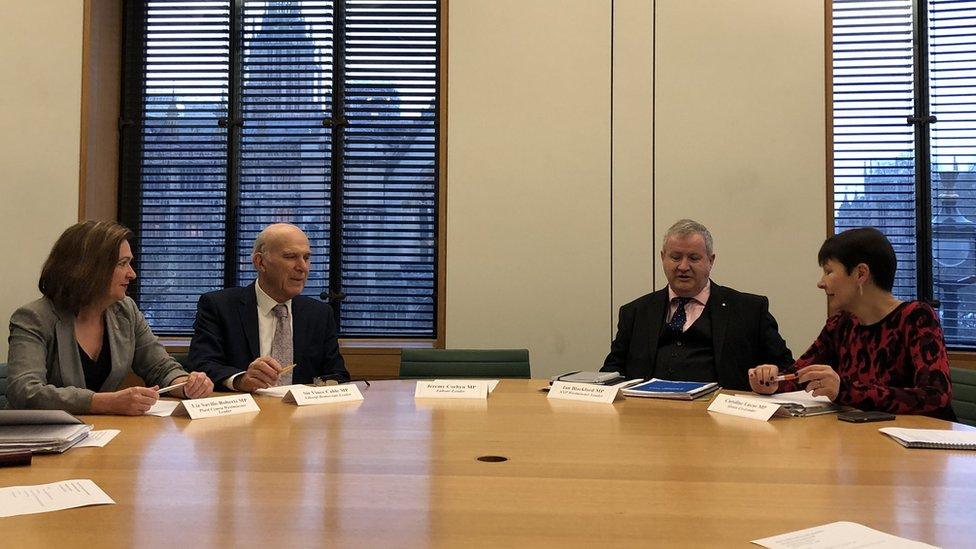
Opposition party leaders met at Westminster to talks about Brexit on Tuesday morning - with an empty chair for Jeremy Corbyn
But Mr Tomkins, the deputy convener of the committee, welcomed the "progress that has been made" in "developing an approach to agreeing common UK frameworks" for returning powers.
And he said members "welcome the UK government's commitment to respect the devolution settlement".
Scottish Brexit minister Mike Russell - who welcomed the committee's report - has said the government is looking at the possibility of introducing its own "continuity" legislation, should it fail to come to an agreement over the UK bill.
The committee said this approach would result in "a reduced timetable for parliamentary scrutiny", urging the government to engage in "early discussions" with the parliament about this.
The Scottish and Welsh governments jointly put forward potential amendments to the Withdrawal Bill during the early part of its progress through Westminster, but saw them rejected by MPs.
However, Mr Mundell told MPs on 6 December that "the bill will be amended", later clarifying that this would "happen on report".
Meanwhile, MSPs have been debating the Brexit process and the position of the remaining EU member states on their first day back after the festive recess.
They discussed evidence gathered by the culture, tourism, Europe and external relations committee on the Brexit process, which began with the triggering of Article 50 in March 2016.
- Published12 December 2017
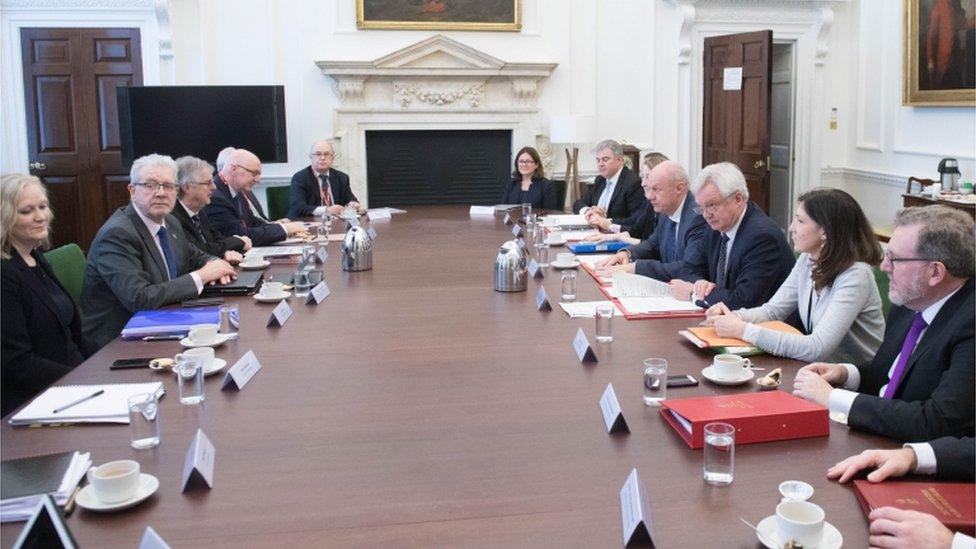
- Published6 December 2017
